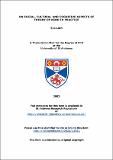On social, cultural and cognitive aspects of theory of mind in practice
Abstract
Theory of mind (ToM) describes the ability to represent internal mental states. We propose that using ToM in practice depends upon the interplay of social, cultural and cognitive factors. The argument is divided into two parts. First, we studied whether people with an Autism Spectrum Disorder (ASD) may have deficits, which impair acquisition of the cultural knowledge necessary to use ToM in practice. The acquisition of shared beliefs, such as social norms, might indirectly rely on metarepresentational capacities. Moreover, a piecemeal processing style - Weak Central Coherence (WCC) - might translate into difficulties in the acquisition of scripts of routine events, which are normally represented as holistic, hierarchically organised knowledge structures. In four experiments we show, first, that WCC may be specific, but not universal to individuals with ASD and that WCC and ToM deficits frequently overlap. Of the ASD group with different levels of ToM abilities, only those with ToM deficits had greater impairments in drawing inferences from social norms than matched control groups. Script abnormalities ranged from a profound lack of event knowledge to more subtle qualitative peculiarities. Especially ASD with WCC and ToM deficits showed a tendency to treat optional and very specific event acts that could occur as should be occurring. The second part of the argument investigated whether power relations affect ToM usage in ordinary adults. A method to track and categorise ToM in ordinary talk was developed to study adults' accounts of real-life experiences in multi-cultural settings. Key findings were that the quality and quantity of ToM talk differed when people accounted for experiences of situated powerlessness (that is, experiences of being discriminated against) compared to when they considered episodes in which power relations were equal. Preliminary data from an experimental study suggests that adults were more inaccurate in inferring the mental states of less powerful as opposed to equally powerful others. We conclude by suggesting that an integrated social, cultural and cognitive framework of ToM in practice may contribute to our understanding of the social phenotype of ASD as well as it provides a new perspective on social phenomena such as intergroup relations.
Type
Thesis, PhD Doctor of Philosophy
Collections
Items in the St Andrews Research Repository are protected by copyright, with all rights reserved, unless otherwise indicated.

